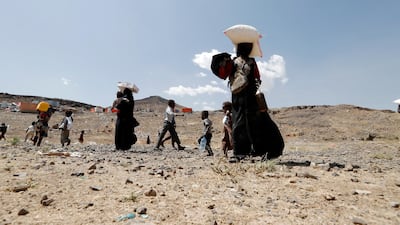UN Secretary General Antonio Guterres on Monday said donors had pledged a "disappointing" $1.7 billion for relief efforts in Yemen, far short of the $3.85bn needed for a country on the brink of famine.
Mr Guterres criticised the weak response at a UN pledging conference, hosted online by Switzerland and Sweden, as humanitarians warned of cutbacks to food handouts in the Arab world’s poorest country.
“Millions of Yemeni children, women and men desperately need aid to live. Cutting aid is a death sentence,” he said.
“The best that can be said about today is that it represents a downpayment.
"I thank those who did pledge generously and I ask others to consider again what they can do to help stave off the worst famine the world has seen in decades.”
At the conference, US Secretary of State Antony Blinken increased this year’s funding from America to more than $350 million, while UAE Minister of State for International Co-operation Reem Al Hashimy announced a $230m pledge.
Jan Egeland, head of the Norwegian Refugee Council, a charity operating in Yemen, said he was disappointed at the low level of funding for the crisis and warned of “massive cuts to emergency food, water, shelter and medical support”.
“Yemen needs three things to avert a catastrophe: more money that we can use today; a famine-prevention ceasefire; and full access to people in need,” Mr Egeland said.
Donors met amid renewed fighting in Yemen's civil war, with the Iran-backed Houthis' offensive on Marib, the government's last northern stronghold and a centre for oil production, about 120 kilometres east of the rebel-held capital, Sanaa.
There are hopes that the administration of US President Joe Biden could revive a stalled peace process and hasten an end to the devastating conflict.
Fighting erupted in Yemen in 2014, when the Houthis seized Sanaa and much of the country’s cities in the north.
An Arab military coalition led by Saudi Arabia and backed by the US and Britain intervened in 2015 in a bid to restore the internationally recognised government of Yemeni President Abdrabu Mansur Hadi to power.
The war has killed about 130,000 people and displaced millions, international monitors say, pushing Yemen to the brink of famine and what the UN calls the world’s worst humanitarian crisis.
“The only path to peace is through an immediate, nationwide ceasefire and a set of confidence-building measures, followed by an inclusive, Yemeni-led political process under United Nations auspices and supported by the international community,” Mr Guterres said. “There is no other solution.”


